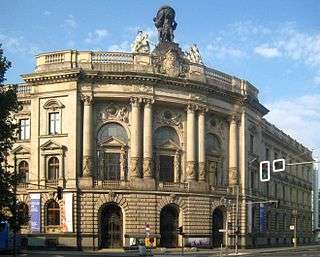Reichspostministerium

The Reichspostministerium (RPM) in Berlin was the Ministry of Posts and Telecommunications of the German Weimar Republic from 1919 until 1933 as well as of Nazi Germany from 1933 to 1945. Especially during the Nazi rule, it had authority over research and development departments in the areas of television engineering, high-frequency technology, cable (wide-band) transmission, metrology, and acoustics (microphone technology).
Formation
After World War I, the ministry succeeded the former Reichspost agency of the German Empire, established in the course of the German unification in 1871. In 1920 the Telegraphentechnische Reichsamt department for telegraphy was established, re-arranged as the Reichspostzentralamt research centre for telegraphy, telephony and radio electronics in 1928.
On 1 January 1937, Department VIII of the former Reichspostzentralamt formed the core of the Forschungsanstalt der Deutschen Reichspost. From that date, the RPM subsumed all research and development departments in the areas of television engineering, high-frequency technology, cable (wide-band) transmission, metrology, and acoustics (microphone technology). The engineer Wilhelm Ohnesorge became the Postal Minister from February of that year. The RPM had its own 500,000-square meter research site in Miersdorf near Zeuthen outside of Berlin. Dr. Friedrich Wilhelm Banneitz, a television authority, was head of research. Dr. Friedrich Vilbig, an authority on high-frequency engineering,[1] was his deputy.[2]
In 1942, the armed postal security service was subsumed into the Schutzstaffel (SS); this was just one more step in the national socialization of the Deutsche Reichspost.[3]
Activities
The RPM supported independent research, such as nuclear physics, high-frequency technology, isotope separation, electron microscopy, and communications technology at the private research laboratory Forschungslaboratoriums für Elektronenphysik of Manfred von Ardenne, in Berlin-Lichterfelde. In 1940, the RPM began construction of a cyclotron for von Ardenne; it was completed in 1945.[4][5]
Bibliography
- Klaus Hentschel, editor and Ann M. Hentschel, editorial assistant and Translator Physics and National Socialism: An Anthology of Primary Sources (Birkhäuser, 1996)
- Oleynikov, Pavel V. German Scientists in the Soviet Atomic Project, The Nonproliferation Review Volume 7, Number 2, 1 – 30 (2000). The author has been a group leader at the Institute of Technical Physics of the Russian Federal Nuclear Center in Snezhinsk (Chelyabinsk-70).
Notes
- ↑ Fritz Vilbig Lehrbuch der Hochfrequenztechnik (Geest & Portig, 1960)
- ↑ Hentschel and Hentschel, 1996, Appendix C; see the entry for Reichspostministerium.
- ↑ Hentschel and Hentschel, 1996, Appendix C; see the entry for Reichspostministerium.
- ↑ Oleynikov, 2000, 6-7.
- ↑ Hentschel and Hentschel, 1996, 354 and Appendix C; see the entry for Reichspostministerium.
Coordinates: 52°30′35″N 13°23′13″E / 52.50972°N 13.38694°E